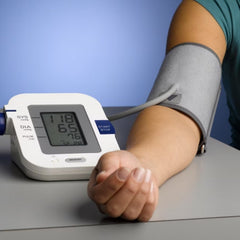Certain Types of Diabetes May Be Reversible: B Vitamin Supplementation Linked to Reduced Risk
Table of Contents:
Diabetes is a chronic metabolic disorder with a steadily rising incidence in recent years, becoming a significant threat to public health. Fortunately, abnormal blood glucose levels are not necessarily irreversible. Particularly during the prediabetic stage or shortly after diagnosis, scientific intervention can offer a substantial chance to delay or even reverse disease progression. In addition to well-known strategies such as dietary control and increased physical activity, emerging research has found that certain nutritional supplements may also play a positive role in preventing and improving blood sugar control. For instance, appropriate supplementation of B vitamins may serve as a helpful aid in blood glucose management.

High Blood Sugar Can Be Reversed
During Prediabetes or Early Diagnosis
Some individuals may feel reassured after seeing their physical examination results, thinking that although their blood sugar levels exceed the normal range, the absence of a diabetes diagnosis implies good health. In reality, such individuals are already in the prediabetic stage—just one step away from developing diabetes.
Lifestyle interventions during the prediabetic phase can prevent progression in approximately half of these individuals. Even among those who do eventually develop diabetes, early intervention can reduce the risk of cardiovascular events by about 30%.
Prediabetes is usually asymptomatic and is often only discovered through blood glucose testing. It includes impaired fasting glucose (IFG) and/or impaired glucose tolerance (IGT). IFG is defined as a fasting blood glucose level between 6.1 and 7.0 mmol/L, while IGT is characterized by a two-hour postprandial blood glucose level between 7.8 and 11.1 mmol/L. Individuals with both abnormalities have a higher risk of progressing to diabetes compared to those with just one.
In the early stages of type 2 diabetes, the duration of glucotoxicity is relatively short. If promptly addressed, pancreatic beta cell function may still recover. For patients diagnosed within five years, who are overweight, have high C-peptide levels, and are antibody-negative, the likelihood of diabetes reversal can be as high as 70%.
Reversal of Type 2 Diabetes
The root cause of type 2 diabetes lies in obesity. Effective weight loss can address insulin resistance at its source, leading to improved blood glucose levels. With lifestyle changes and appropriate medication, many patients have achieved reductions in weight and blood lipids, along with better blood glucose control.
Important Note: Even if blood sugar levels return to normal, vigilance must be maintained. A relapse into unhealthy habits—overeating and physical inactivity—can cause blood glucose to rise again, even if weight has not yet significantly increased. Therefore, regular blood sugar monitoring and a sustained healthy lifestyle are crucial.
Prediabetes Is Often Silent
Prediabetes is typically symptomless, particularly in type 2 diabetes, which often has an insidious onset. In contrast, type 1 diabetes presents acutely, with classic symptoms such as increased appetite, thirst, urination, and rapid weight loss.
For individuals with a family history of diabetes, such as those with diabetic parents, routine blood glucose screening during check-ups is especially important. This enables early detection and timely intervention.
B Vitamins May Support Blood Sugar Control
A recent study published in the reputable nutrition journal *Nutrients* found that proper supplementation of B vitamins is associated with a lower risk of developing type 2 diabetes, with vitamin B6 showing the strongest effect. This relationship may be partly mediated by anti-inflammatory mechanisms.
Food Sources: B vitamins are commonly found in foods such as organ meats, legumes, dairy products, eggs, poultry, fish, and whole grains.
Scientific Approaches to Blood Sugar Control
Appropriate Exercise
Diabetes patients should select physical activities that suit their age and health status. Aerobic exercises are especially recommended, such as jogging, dancing, or swimming. Aim for at least 30 minutes per session, five or more times a week, totaling about 150 minutes per week.
Balanced Diet
Blood sugar control does not mean starving oneself, but rather ensuring adequate yet not excessive nutrition.
Patients can follow this eating order for better glucose management:
- Start with a bowl of soup, preferably vegetable-based;
- Then consume cold or stir-fried vegetables;
- Next, eat protein-rich foods like meat or fish;
- Finally, eat the staple foods—ideally a mix of whole and refined grains.
Note: For those who frequently eat cafeteria or takeout meals due to work, there may be a risk of micronutrient deficiency. In such cases, supplements may be taken under medical supervision. However, it's essential to understand that supplements are not substitutes for medication. Avoid delaying treatment out of fear of drug side effects, as complications can make blood glucose control even more difficult.
Blood Glucose Monitoring
Self-monitoring is essential for diabetes management. Understanding one’s glucose levels is key to effective patient-provider collaboration and optimal blood sugar control.
Timely Medication Use
For individuals whose blood glucose levels remain uncontrolled despite lifestyle changes, it is critical to start antidiabetic medications promptly and adhere to prescribed dosages. This not only lowers blood sugar but also helps prevent complications.
FAQs about Diabetes
Are Apples Good for A Diabetic?
Yes, apples can be a good snack for people with diabetes. They are rich in fiber, which helps slow down the digestion of sugars and may prevent spikes in blood sugar levels.
Are Beans Good for Diabetes?
Yes, beans are good for diabetes because they have a low glycemic index, meaning they cause a slower, steadier rise in blood sugar levels. They are also rich in protein and dietary fiber, which help improve blood sugar control and keep you feeling full longer.
Are Cherries Healthy for Diabetics?
Yes, cherries are healthy for diabetics. They are a low glycemic index (GI) fruit, which means they can help regulate blood sugar levels more effectively. In addition, cherries are rich in nutrients beneficial for diabetes management, including vitamin C and fiber, which support overall health and help control blood glucose.
Are Cucumbers Good for Diabetics?
Yes, cucumbers are good for diabetics because they are a low-carbohydrate, non-starchy vegetable. They have a minimal impact on blood sugar levels, making them a safe and healthy choice for people managing diabetes. Their high water content also helps with hydration and overall health.
Are Olives Good for Diabetics?
Yes, olives can be beneficial for diabetics because they contain a natural compound called linoleic acid. Linoleic acid has been shown to help lower blood sugar levels, making olives a healthy snack option for people managing diabetes.





